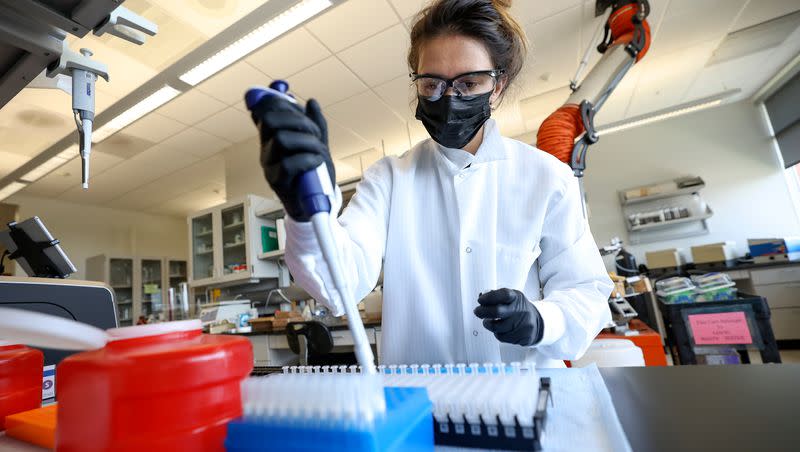How a bipartisan bill co-sponsored by Sen. Mitt Romney could help communities track COVID-19 and fight future pandemics

- Oops!Something went wrong.Please try again later.
A bipartisan U.S. Senate group introduced a bill Wednesday meant to help communities track pathogens in wastewater, including tracking the presence of SARS-CoV-2, which causes COVID-19.
Sens. Mitt Romney, R-Utah, Cory Booker, D-N.J., and Angus King, I-Maine, co-sponsored the bill, which would award grants to state, tribal governments and local health departments. The Public Health Response and Emergency Detection Through Integrated Wastewater Surveillance Act, or PREDICT Act, also includes investments to develop best practices for wastewater data collection.
“Wastewater surveillance is a powerful tool to rapidly detect infectious diseases and protect our nation’s public health,” Booker said in a statement. He said the investments would “strengthen our ability to detect and respond to public health emergencies swiftly and deploy targeted interventions to prevent outbreaks.”
King said “the bipartisan PREDICT Act will help identify potentially dangerous viruses,” and Romney said it would help communities fight future pandemics.
“We learned from the COVID-19 pandemic that monitoring wastewater systems can provide dependable data which can be used to detect and track the spread of infectious disease,” Romney said in a statement. “This bill will bolster Utah’s already sophisticated wastewater monitoring technology by ensuring it receives the funding needed to continue to invest in new research and technology, so we can be better equipped to fight future pandemics.”
To be eligible for a grant under the legislation, public health agencies would have to show plans about how they would provide public access to wastewater surveillance data as well as an assessment of their community’s infectious disease monitoring needs, according to the bill.
Related
Wastewater data collection involves collecting samples from community wastewater and testing for the genetic material from the virus. This method can detect the presence of SARS-CoV-2 shed even by people who have no symptoms and be an indicator if the number of people in a community with COVID-19 is rising or falling, according to the Centers for Disease Control and Prevention.
Wastewater data collection has become an especially important tool to fight COVID-19 since the shift to more at-home antigen tests has meant some people test positive for the virus but do not contact their local public health agency.
Some communities began wastewater data collection before the pandemic. The city of Tempe, Arizona, and Arizona State University began wastewater surveillance in 2018 to monitor opioid use, and beginning in 2020, they started testing for the virus that causes COVID-19, according to the Arizona Department of Health Services. Tempe now offers the public a dashboard that shows average weekly results of COVID-19 virus genome copies per liter of wastewater in nine different sections of the city.
Related
Romney, Booker and King said the PREDICT Act is also being included in the Pandemic and All Hazards Preparedness Act of 2023, a package of reauthorization bills. An original Pandemic and All Hazards Preparedness Act was signed into law by then-President George W. Bush in 2006, and was meant to prepare for deliberate, accidental or natural public health and medical emergencies, according to the Department of Health and Human Services. Then-President Barack Obama signed a reauthorization in 2013.
The public health emergency for COVID-19 ended on May 11, but it continues to kill hundreds of Americans every week. COVID-19 was the No. 4 cause of death in the U.S. in 2022, per CDC data, following heart disease, cancer and unintentional injuries.

